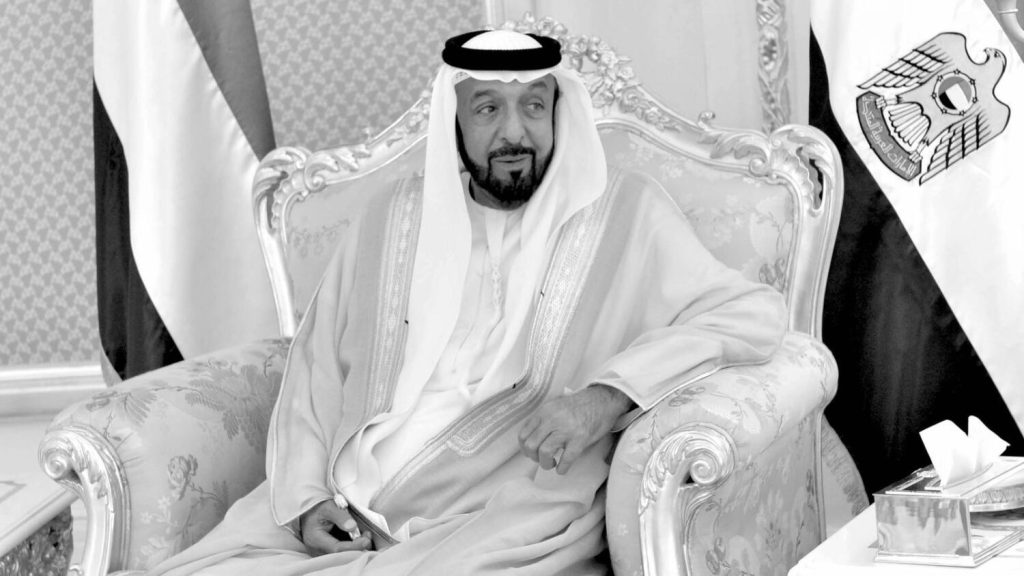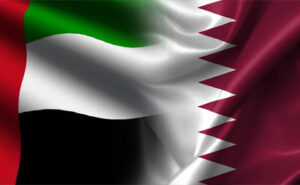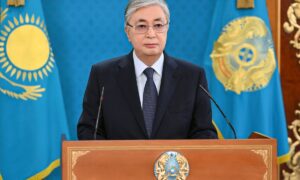First death anniversary of Khalifa bin Zayed, Leader who championed empowerment

Abu Dhabi, The Gulf Observer: A year ago today, the late Sheikh Khalifa bin Zayed Al Nahyan passed away.
Sheikh Khalifa underwent a rich journey alongside the Founding Leader, the late Sheikh Zayed bin Sultan Al Nahyan, strengthening the country’s achievements and planning its future.
He assisted and supported the country’s foundation before becoming the leader of its empowerment.
The late Sheikh Khalifa took office on 4th November, 2004, after the death of Sheikh Zayed, whose legacy he continued until he passed away on 13th May, 2022. Under his leadership, the UAE became the second-largest economy in the Arab world and the first Arab and Islamic nation to reach Mars, among many other remarkable achievements in various fields.
Foreign Aid
As a leader, the late Sheikh Khalifa bin Zayed Al Nahyan was generous and compassionate to those in need around the world. He guided the UAE to provide foreign aid to many countries, to reduce poverty, support vulnerable communities, promote peace, prosperity and stability, and encourage economic growth in developing countries.
Foreign aid worth more than AED320 billion from the UAE reached nearly 155 countries from its establishment in 1971 to 2021.
Strategic Ties
Under the leadership of the late Sheikh Khalifa, the UAE strengthened its prominent stature and leading regional and global role by creating deep-rooted relations with many countries based on mutual respect and supporting international peace and stability.
As a wise leader, Sheikh Khalifa saw the Gulf Cooperation Council (GCC) region as a strategic area influencing the world’s security and stability. He also followed the Founding Leader’s stance of standing with Arab countries, supporting their causes and strengthening their relations. Under his rule, the UAE became more open to the world and built partnerships with other nations.
Strategic Planning
To plan for the future, the late Sheikh Khalifa established the foundations of the country’s empowerment phase by launching long-term national strategies, initiatives and plans, which include the Principles of the 50, the UAE Vision 2021, the UAE Net Zero by 50 Initiative, the Digital Government Strategy 2025, the UAE Strategy for Artificial Intelligence, the UAE Government Services Strategy 2021-2025, the Energy Strategy 2050, the National Food Security Strategy and the National Space Strategy 2030.
Women
Empowering Emirati women in all areas was always a priority for the late Sheikh Khalifa, who saw them as vital partners in the country’s development.
During his rule, the UAE achieved remarkable progress in empowering women on various levels. Women now make up 27.5 percent of the UAE Cabinet and hold half of the Federal National Council (FNC) seats, sharing equal representation with men.
He also implemented several decrees that increased women’s involvement and empowerment, such as a decree that ensures equal pay for men and women in the private sector undertaking the same or equivalent work, as well as a law that abolishes all restrictions for women to work at night or in demanding jobs.
Empowerment
Under the late Sheikh Khalifa bin Zayed Al Nahyan’s leadership, the Emirati parliament significantly improved its performance and increased its influence in lawmaking and oversight.
He also initiated a political empowerment programme in 2005 aimed at enhancing the FNC’s role as an authority that advises and assists executive authorities.
Health
The late Sheikh Khalifa bin Zayed Al Nahyan demonstrated his commitment to the health sector, by raising its share of public spending to as high as 7 percent of the federal budget.
Due to this long-term spending, the UAE’s health sector is prepared and able to cope with any challenges, proven by its efficiency in managing the COVID-19 pandemic, the most severe outbreak in human history.
Under the leadership of the late Sheikh Khalifa, the number of Emirati hospitals has increased many times, from 16 in 1975 to 169 in 2020.
Education
The late Sheikh Khalifa believed that education is the driving force of development, and the education system should be based on certain principles, such as ensuring and providing free education for all citizens.
This was reinforced by the Wadima Law, which was issued in 2012 and made education mandatory for everyone from the age of six until the end of secondary school. It also secures the right of every child to education.
The country aims to create an education system that equips students with the skills they need for the 21st century, offers a high-quality university education that rivals the best in the world, fosters innovation, reaches more learners, and cultivates a culture of innovation among all educators.
Infrastructure
The late Sheikh Khalifa led the UAE to many accomplishments, including reaching the top 10 positions worldwide in 20 key energy and infrastructure indicators of global competitiveness in 2021.
His wise vision and support enabled the UAE to achieve remarkable advances in infrastructure and housing.
Space
Under the late Sheikh Khalifa’s vision, the UAE aimed for the stars and achieved remarkable success in space exploration.
On 9th February, 2021, it became the fifth country in the world to reach Mars. It also sent the first Emirati and Arab astronaut, Hazza Al Mansouri, to the International Space Station in September 2019, a first since the station’s launch in 1998.
After establishing the UAE Space Agency in 2014 and launching KhalifaSat, the first wholly developed and manufactured Emirati satellite, in 2018, the UAE announced, in 2020, that it would launch the first Arab mission to the Moon.
Economy
Sheikh Khalifa’s leadership led to remarkable economic progress for the UAE. The country’s GDP has grown several times since 2004 and will reach AED1.5 trillion by the end of 2021.
Culture
Under the leadership of the late Sheikh Khalifa bin Zayed Al Nahyan, the UAE made remarkable progress in the culture and arts sector. The UAE’s heritage, culture and art reached global recognition through major projects and collaborations with international entities.
One of these projects is the cultural district on Saadiyat Island in Abu Dhabi, which hosts some of the world’s most prestigious cultural institutions, such as the Louvre Abu Dhabi, the Zayed National Museum, and the Guggenheim Abu Dhabi.
The UAE has been a global leader in protecting and restoring world heritage sites, following a vision of tolerance and coexistence. Some of the historical landmarks that the UAE has helped preserve include the Al Nuri Mosque and its leaning minaret and two churches in Mosul, Iraq; the Sheikh Khalifa Theatre of the Palace of Fontainebleau in France; the Museum of Islamic Art in Egypt; the Macmillan Historical Library in Nairobi, Kenya; and the “Lodge of Peace” in Muharraq, Bahrain.


